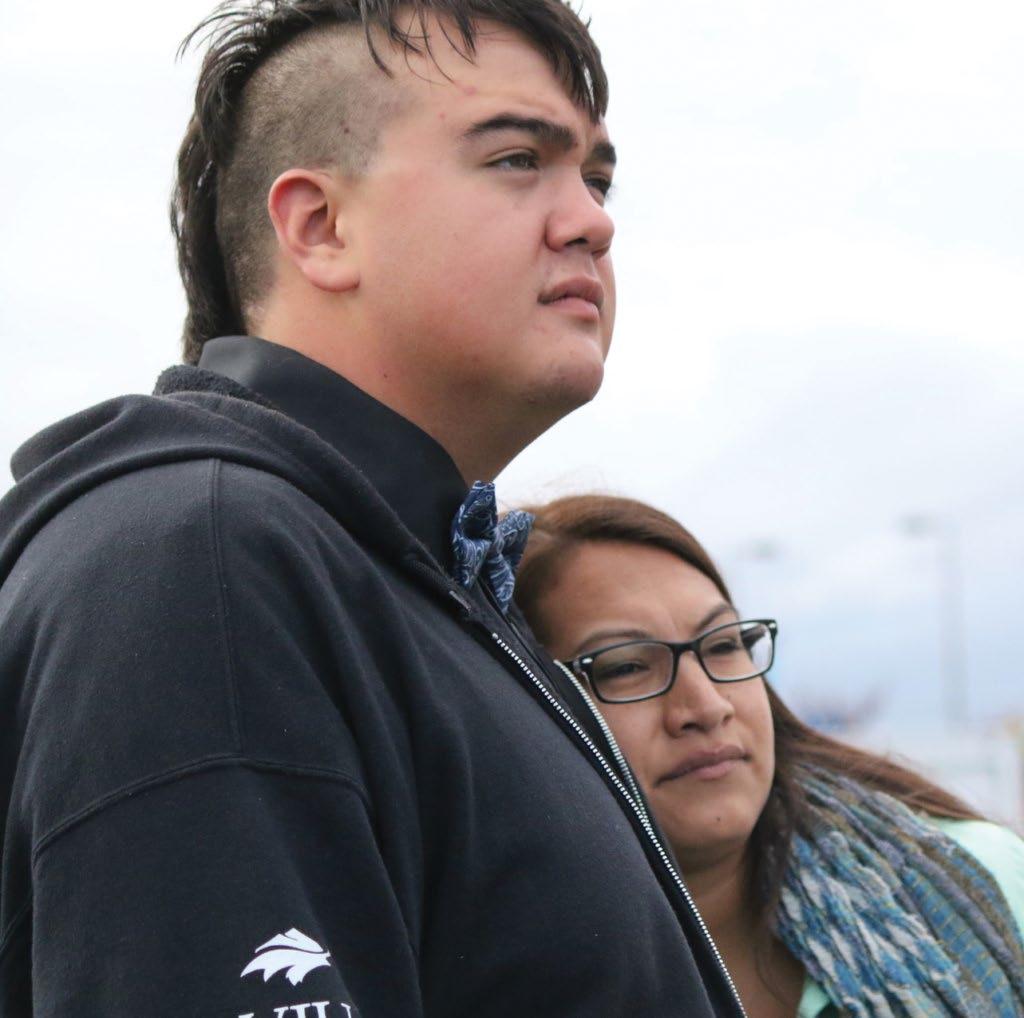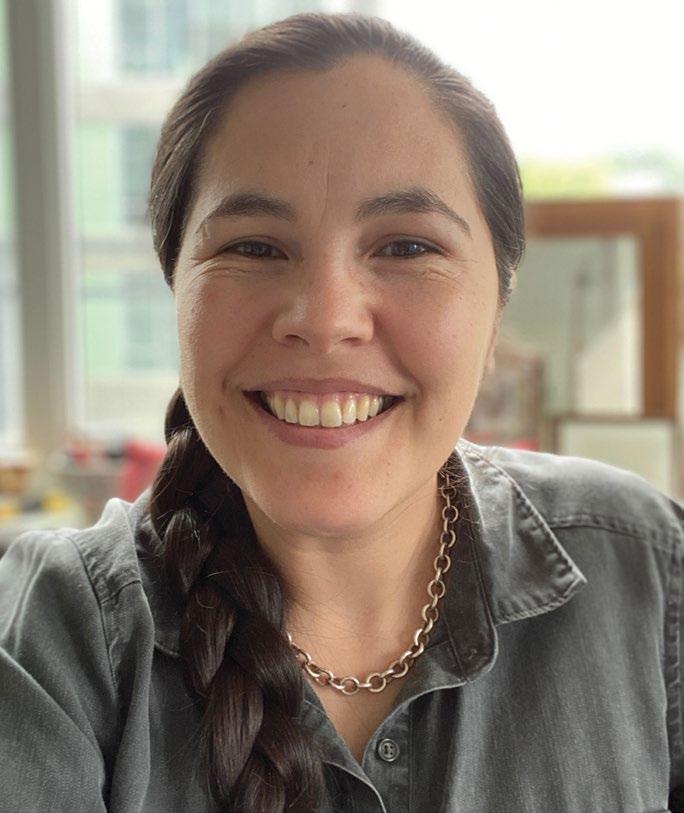
6 minute read
Indigenous Impact
BY JEFF TODD
When most people think about The Mastercard Foundation, the continent of Africa springs to mind.
Headquartered in Toronto, but with a global focus, the foundation has both donated and committed billions to help create large-scale social and economic change for Africa’s youth. But closer to home, The Mastercard Foundation is steadily ramping up its support for another group — Indigenous communities here in Canada.
For the last few years, a relatively new initiative, EleV, has already committed tens of millions towards Indigenous youth, institutions and programming. It is a small, yet focused group of partners, all with the goal of creating systemic, lasting change aligned to the vision and aspirations of Indigenous young people.
“To achieve systems change, it really requires a deep commitment to learning as well,” Justin Wiebe explains, a Partner at The Mastercard Foundation and a proud Métis citizen.
“In all our partnerships, we invest significantly in learning and understanding how things are working. The longer-term vision is how we are communicating those learnings and insights out more publicly so other institutions and organizations can see this positive impact and pick those things up.”
And it appears now more than ever, people are listening.
In May of this year, the Canadian public was shocked and saddened when the bodies of 215 children were confirmed on the site of the Kamloops Indian Residential School in Kamloops, British Columbia. The confirmations set off an avalanche of sadness, anger and introspection across Canada, as hundreds of other unmarked graves continue to be found throughout the country.
Canada is fresh off its first National Day for Truth and Reconciliation in September, with Canadians across the country wearing orange to reflect and remember those that died and continue to be impacted by the legacy of residential schools. Meanwhile, it was recently announced by the Vatican that Pope Francis will visit Canada in December, meet Indigenous leaders and take another step forward towards reconciliation.
But immense challenges remain: for the average Canadian, how to genuinely assist Indigenous-led causes, and create meaningful change, is no easy task.
Many Canadians are left wondering: beyond acknowledging the past, what can I do to help? How can I make a meaningful impact?
Put simply, where do I start?
For The Mastercard Foundation, the focus has been investing in the next generation of Indigenous youth through post-secondary education, training, employment and entrepreneurship. That involves, deep, long-term relationships with Indigenous communities, educational institutions and other allies, Wiebe says.
In Ontario, for example, the foundation supports the Seven Generations Education Institute, an Anishinaabecontrolled college that delivers fully credentialed degrees, diplomas and certificates grounded in Anishinaabe culture and language.
“Our partnership with Seven Generations is focused on increasing language fluency and support for the next generation of leaders, Wiebe adds, who was hired three years ago with the aim of boosting their Canadian operations for Indigenous communities.
Large entities like The Mastercard Foundation are investing in Indigenous causes. But how can everyday Canadians make a genuine, lasting difference?
“We believe that Indigenous institutes, and our communities broadly, have the solutions. It’s our role to invest in their expertise and capacity to lead change.”
The vision, he explains, is not to provide bursaries, or function within a “broken post-secondary funding system.” Rather, new models must be created to generate true impact.
In southern Alberta, a partnership with the University of Lethbridge and the Blackfoot Confederacy helped expand the Indigenous Student Success Cohort, a tuition-free program that provides additional wrap around supports to help guarantee the success of young people, while also staying true to their linguistic and cultural roots.
Expand and build partnerships
All told, The Mastercard Foundation has established nine long-term partnerships in Canada focused on Indigenous youth. Wiebe says the foundation will continue to expand and build new partnerships over the next five years.
While The Mastercard Foundation, from a high level perspective, is contributing to Indigenous-led efforts to tackle complex challenges, the picture for Indigenous-led causes on the ground is by no means perfect.

Kris Archie, CEO of The Circle on Philanthropy and Aboriginal Peoples in Canada, or The Circle.
Kris Archie, CEO of The Circle on Philanthropy and Aboriginal Peoples in Canada, or The Circle, agrees that there is a rise in interest to support Indigenous issues and causes. However, actual dollars rarely make it directly into the hands of Indigenous-led or informed organizations.
Measuring the Circle, a study completed in both 2014 and 2017, found that less than 1 percent of philanthropic dollars go towards Indigenous-led organizations.
“We are working against broad stereotypes that issues related to Indigenous Peoples are not the problems of Canadians,” Archie explains, who joined the organization in July 2017.
“The thinking has been: Indigenous issues are their issues, or the responsibility with them lays with the federal government. So I think it is not just about the settler philanthropic sector catching up. I think it is also the Canadian narrative about Indigenous Peoples in this country is rife with stereotypes about Indigenous People always asking for another handout.”
The Circle, as the name implies, includes an intimate collection of members that seek to break down these stereotypes, while promoting more giving and bridge building with Indigenous-led and informed groups . The organization offers learning, training and workshops for a broad range of members, from the Toronto Foundation, to Home Depot Canada, to Petsmart. The second audience is Indigenous-led and informed organizations.
“A unique feature of The Circle is they [Indigenous-led and informed causes] provide us with a lot of guidance on how they want to relate with settler philanthropic institutions and our work is to facilitate those relationships,” she explains
Wiebe, who also sits on The Circle’s board, shares that “on a personal level, The Circle is so valuable as a sounding board, to test ideas and have difficult conservations. The Circle is critical to helping enable our sector to do more and live up to our responsibilities. Most people don’t know how to do reconciliation and are terrified of making a mistake. So to have an organization that is able to guide, share insights and learnings, and host difficult conversations is really helpful for foundations and others eager to think and work in different ways”.
As for donors and volunteers, Archie explains that listening is certainly not everything. What Indigenous-led causes really need is support. The Circle CEO points out that, too often, Canadians place far too much weight on the need to understand Indigenous issues and causes.
Archie also recommends taking the time to understand whose land and territory you are on.
Have to be committed
Next, think local: consider supporting your local friendship Centre, for example, with 125 of them spread out among urban communities across the country. In fact, Toronto is home to the Ontario Federation of Indigenous Friendship Centres on Front Street.
Research other local, Indigenous-led or informed organizations in your area, such as the Ontario Indigenous Youth Partnership Project, where all the grant decision making and programming is done by Indigenous youth.
You don’t have to be a billion-dollar foundation to make a difference, Archie says. But you do have to be committed to making that difference.
The balance is to do your listening on your own,” she says. “And then act. And you don’t need to do all the learning in the world to act. There are undeniable issues and causes that need to be supported. You don’t need to know every piece of data and research to understand that not having drinking water is a problem. You don’t need to know how many more children’s bodies are going to be discovered beside Indian residential school to recognize that is harmful.”
In other words, the time for action is now.
JEFF TODD is Director of Marketing and Communications at The WCPD Foundation. He is also PresidentElect and VP of Partnerships for the Association of Fundraising Professionals (AFP) in Ottawa, Chairman of the Board for the Canadian National Institute of the Blind (CNIB) in Eastern Ontario, an advisor to Beneath the Waves and Co-Founder of the Exuma Foundation of Canada.




